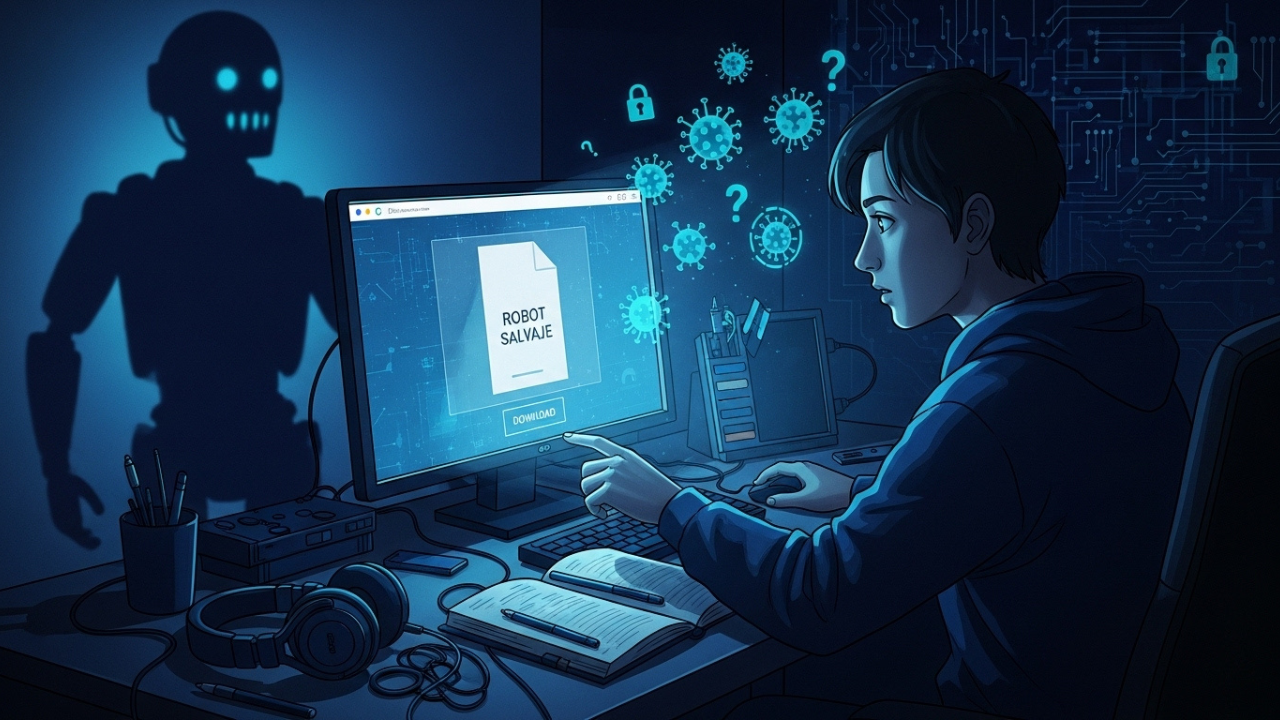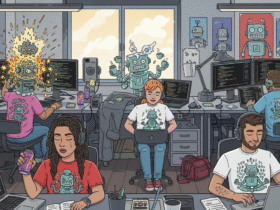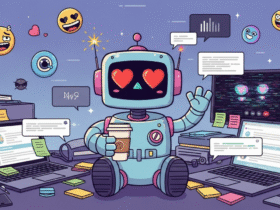Weird bits of data drift across the web like lost balloons and nobody knows who let them go. Some days you stumble on forgotten cartoons, other days a DIY videogame, and today its something tagged Robot Salvaje. Maybe it popped up in a busy Reddit thread. Maybe a friend tossed you the link in a late-night chat. Either way, curiosity pinches you. What is it?
Is it an underground classic? A stray piece of art you never knew existed? But the file lives on Google Drive, and the title sounds like an eager glitch from a dusty space opera. So instead of daydreaming about the plot, one question lodges in your mind: will downloading Robot Salvaje load malware onto my machine?
I see you-you dont hammer the mouse for fun. You want facts, not vague horror tales. So lets break the mystery.
Key Takeaways
- A shiny name and cool cover art cant substitute real trust.
- Scan every file before you open it, no matter the cloud service.
- Google Drive is a highway, not a security gate. Anyone can park something risky there.
- When a link feels shaky, listen to your gut.
- You steer your clicks. Drive wisely.
What Is Robot Salvaje and Why Is It on Google Drive?
No one can claim certain knowledge of Robot Salvaje, and that very uncertainty fuels concern. It might be a short film, a game mod, raw research data, or simply an orphaned attachment drifting through the cloud. That lack of clarity is itself the first warning sign.
Google Drive lets anyone share anything with a quick link. That freedom is great until it bites you. Most of the time good friends drop cool photos or useful documents. But every now and then a shady account uploads a sick file and sprays the link like confetti, hoping no one stops to check. Unlike most websites, where a human sits at the door, Drive links can glide past anonymous, unfiltered, and almost impossible to trace.
Thats exactly how Robot Salvaje blew up. Its sitting on trending lists not because Google gave it a badge, but because curiosity spread like a wildfire meme. Maybe the file is clean. Maybe it hides malware. Because the source is shadowy, nobody can tell at a glance. So when you hit that link, you step into a blind alley.
And with blind alleys, guessing your safety can cost you far too much.
How Public Google Drive Files Work
Shared Access and Visibility
If someone slides a Google Drive link your way, that document is probably either public or eying the next closest group. Anyone with the link can open it, watch it, and pull a copy onto their desktop. Because Google skips sign-ins for open links, sharing is easy-and so is passing along hidden trouble.
The big red flag is that anyone can craft these links. You dont have to log in, prove who you are, or wait for an admin to nod yes. A file can go public and be tossed around in seconds, usually with zero checks on what really lives inside.
File Scanning Limitations
Google Drive does a quick safety check, yet its eyes miss plenty. If a file is big, zipped, or an .exe, the scan often stops early. Even during that brief look, the scan is hardly a guarantee. Bad code can linger in macros, scripts, or files that look like normal photos.
The biggest blunder? Assuming a Drive file is bulletproof just because it lives on Googles turf. This guess has trapped far more users than youd expect.
What Could Go Wrong If You Download It?
Lets be honest: trouble can show up in several nasty ways, and it rarely knocks first. When problems hit, they tend to spread faster than anyone wants.
Malware Risks
The first threat is plain old malware. Accepting a rogue file is like stepping into a bear trap while blindfolded. Viruses, worms, ransomware, and similar pests dont always shout; many hide, then spring. Some sit still for weeks, others zap your files the moment you click.
Take a sketchy game like Robot Salvaje. If you tweak that package, it might slip in secret scripts. The second you unzip or run the installer, the code asks for total control. From there, your system could start spying, drop extra payloads, or even freeze solid.
Spyware and Tracking
Spyware is another hidden danger. Unlike loud viruses that crash your machine, spyware prefers silence. It creeps onto your device, watches what you do, and gathers every scrap of data it can find. Depending on its design, it might record your keystrokes, monitor your web visits, or sneak away copies of saved passwords to an overseas hacker.
Because it hides so well, spotting spyware is tricky. You usually get no flashing pop-ups or sudden slowdowns. Yet, while you browse, an unseen stranger could be reading each word you type.
How to Spot a Dangerous File Before It Hurts You
Small habits like these keep your computer safe. Just like you wouldnt pick up food from the sidewalk without checking it, never open a file just because the title looks cool.
Source Verification
Begin by tracing the link. Where did it come from? A trusted buddy? Or some stranger in that wild Facebook group? If the origin feels blurry, dont be shy about poking around.
Good sources usually show up with clues. It might be a website, a short review, or a discussion thread. If a link drops out of nowhere-hey, check this cool thing!-just walk away.
File Type Awareness
First look at the extension. Is it .exe? .bat? .scr? Those are executables, and unless you can prove the sender is clean, leave them alone. Even PDFs and Word docs can bite if they carry sneaky macros.
ZIP and RAR archives are even sneakier. You think you pull down one image or program, but inside there could be ten shady files waiting to weaponize your machine.
Online Scanners
Before you click on that link, copy it and drop it into a free online scanner like VirusTotal. These services pass the file through dozens of antivirus engines and tell you if anything looks shady. Its quick. Its free. And it could save your whole system.
When in doubt? Just walk away. There will always be other sights to check out tomorrow.
What If You Already Downloaded It?
We all slip up. Maybe the promise of a new tool hooked you. Maybe plain curiosity pushed the button. That happens. What’s important now is what you do next.
First Response
If the file landed but you havent opened it, youre still mostly safe. Leave it unopened. Find the file, right-click it, and choose your antivirus quick scan option. Dont double-click. Dont extract.
If your scanner spots trouble, delete the file, empty the Recycle Bin, and reboot. After that, run a full system scan to catch anything that might have slipped through.
Scanning and Containment
Even if a quick antivirus scan turns up nothing, why not drop the file into a sandbox? Free services such as Any.Run or Hybrid Analysis let you upload questionable files and watch what they do inside a safe, virtual cage.
That extra step really shines when the file is big, complex, or when you just feel your regular antivirus skimmed over something.
Signs of Infection
If youve already opened the file, stay alert. Does your computer feel sluggish? Are apps freezing, your browser hijacked, or pop-up ads appearing out of nowhere?
Any of those clues could mean malware has slipped in. First, yank the cable or turn off Wi-Fi, then back up vital files and run a full scan with two or three antivirus programs. If the warnings dont clear up, call a tech pro; some threats demand a full reset or special tools to scrub them away.
How to Safely Explore the Internet Without Falling for Traps
You dont have to quit surfing. The web still holds plenty of good surprises. Just remember, caution makes the ride smoother.
Defensive Habits
Start by keeping every piece of software up to date. An ancient browser or dusty antivirus app is basically waving a welcome sign at hackers.
Stay away from downloads on forums and social apps unless a trusted user has confirmed the link. Add a good browser extension that blocks shady sites and harmful scripts. And remember: curiosity is normal, but it should never wipe out basic common sense.
Think of unknown files like a stranger knocking at your door. You don t have to let them in. Being doubtful isn t rude; it s smart.
Is There a Safe Way to Access Robot Salvaje?
So, you really want to find out what that mystery file is, huh? Youre ready to take the leap, but only if the landing pad is sturdy.
Best Practices
Okay, heres how to keep your feet dry:
First, drop the file on a computer that holds nothing personal. Even better, fire up a virtual machine-an entire pretend PC inside your real one. If malware stirs, it stays trapped there.
Run both instant-action antivirus and a manual sweep. Free options from Malwarebytes, Kaspersky, or Norton work fine. The second anything looks off, delete the file and power down.
Scour forums and tech boards before proceeding. See if other users have tested the same download, and read their verdict. One bad experience shared online can spare you hours of cleanup.
What If It’s a Pirated Movie or Game?
Pirated movies and cracked games look like easy wins, but they carry hidden baggage.
Legal Risks
If Robot Salvaje is still under copyright, snagging it without paying is against the law. You might shrug it off, but the penalties can stack-fines, streaming bans, or worse.
Authorities in many nations track these downloads. Your IP gets logged, your provider is told, and suddenly you are on a watch list you never asked to join.
No Guarantees from Pirates
Legality is only half the trouble. Pirates never respond when things go wrong. They also shove junk in the files, and some even pack hidden miners that turn your laptop into a coin factory for strangers.
So ask: is a quick deal worth the risk of your machine working for thieves?
Safe Alternatives That Make Sense
Robot Salvaje could be great. Right now nobody knows. If it is, word will spread fast.
Where to Search Safely
Start with simple steps. Type the title into Google. Check YouTube for trailers or lets-plays. Look in Reddit, Quora, and other fan boards for chatter.
Legit creators dont lurk. They post on trusted sites like Itch.io, Bandcamp, Vimeo, or Steam.
If you really want Robot Salvaje, trace the official links, interviews, and announcements.
Protecting Yourself in the Future
One careless download can wipe your system in an afternoon; one careful choice can spare you hours of cleanup and crushed pride.
Long-Term Habits
Train yourself to question every unfamiliar file, verify its source, run a quick scan, and use a virtual machine as a sandbox before opening anything.
Invest in reliable antivirus and a sturdy firewall; schedule regular backups so that, if malware slips in, your data survives the hit.
Talk about what you learn; warn friends, share tips online, and build a network that helps everyone dodge the same traps.
Final Thoughts
Robot Salvaje could be a fascinating mod-or a bait link hiding ransomware; the difference is clear only after you click.
Now that you know better, check, scan, and stay one step ahead every time.
Curiosity brought you here; wisdom will steer your next click.
Explore, enjoy, and never download without a second look.



















Leave a Reply
View Comments